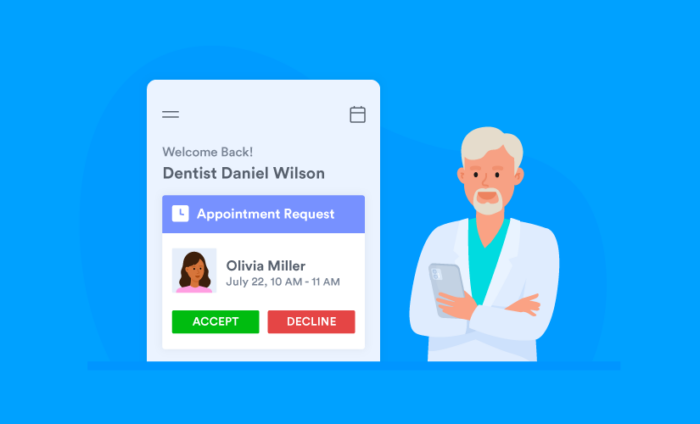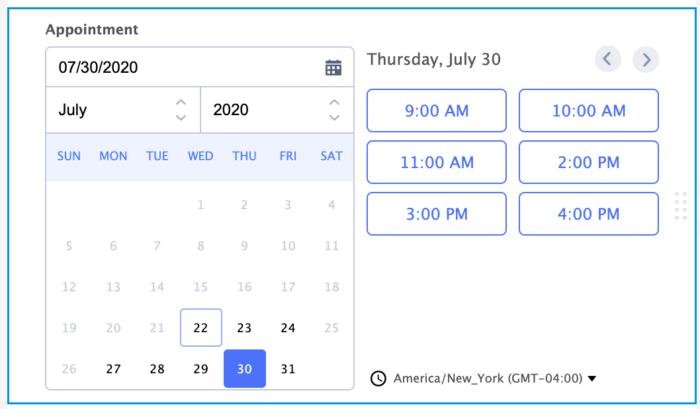Healthcare has long been on the path to using digital solutions, and dentistry is no different. Scheduling dental appointments online is one such area dentists are exploring — perhaps because 44 percent of patients scheduled an appointment after finding a healthcare provider through an online search.
There are many scheduling solutions on the market. How do you go about choosing one? Industry experts recommend asking the questions below to find one that’s a good fit for you.
Ask these questions before selecting a solution for scheduling dental appointments
1. Can you create custom time slots?
Some online schedulers have a default appointment time — typically half an hour. This time may work for a checkup and cleaning, but it doesn’t reserve the time necessary for more intensive dental work.
For example, teeth whitening can take up to an hour. Surgical procedures like extractions, root canals, and dental bridges can take even longer. Regardless of how long each procedure normally takes, your scheduling software should enable you to create custom time slots, as your treatment and procedure times will vary from other dentists’.
Pro Tip
Make dental appointment scheduling easier with an AI phone answering system for faster and more accurate bookings.
2. Does it sync with calendars?
For an optimal experience scheduling dental appointments, your chosen solution should sync with different online calendars — both yours and your patients’. Many people rely on their calendars to remind them of daily commitments; if your appointment doesn’t appear on a patient’s mobile calendar, the chances of their missing it increase. The software should work with iOS and Android to ensure you cater to as many patients as possible.
3. Can you set automatic appointment reminders?
When scheduling dental appointments, the only thing more likely to get patients to show up than calendar syncing is appointment reminders. Your appointment solution should send these reminders automatically.
Dr. Shahrooz Yazdani, dentist and owner of Yazdani Family Dentistry, recommends creating at least two automatic reminders — one for a week before the appointment and another 24 hours before. “This way you maximize the likelihood of a patient not only showing up for their appointment but also showing up on time,” he says.
4. Will it provide a seamless experience for patients?
Dr. Mike Golpa, dentist and CEO of G4 by Golpa, notes that it’s important to limit friction in the scheduling experience: “The whole point of a digital scheduling solution is to make it easier for patients to book their appointments with your practice. If you don’t want to discourage them, make sure the system makes scheduling dental appointments as intuitive and clear as possible.”
Dr. Rajan Sharma, founder of EON Clinics, adds that if potential new patients see a long list of questions on a scheduling form, they are much less likely to fill it out. “The solution shouldn’t require numerous questions, though it’s acceptable if they’re optional,” he says. “Select only the questions you need for patients to determine whether you’re the right provider.”
5. Does it integrate with other solutions?
Your chosen solution should “play well with others,” according to Dr. Sharma. In other words, it should integrate with other software you already use to manage your practice and patient pipeline. For example, one of the biggest selling points of the solution Dr. Sharma selected for his practice was its ability to integrate with Salesforce.
6. Does it allow patients to choose preferred dentists?
Dental practices often have multiple dentists. While some patients don’t mind seeing any dentist available, many patients have a preferred dentist — likely one they’ve seen for years. A valuable feature of appointment scheduling software is the ability for patients to select the dentist of their choice — that way, they don’t show up at your office and wind up with a dentist they’d rather not see.
7. Is it HIPAA-friendly?
Compliance is a concern for scheduling dental appointments, because patients must provide certain information, some of which may be sensitive. That’s why it’s important to make sure that the scheduler you choose is HIPAA-friendly. “This ensures you’re keeping patients’ information safe,” Dr. Sharma says, “and avoiding HIPAA penalties.”
Pro Tip
With Jotform’s appointment field, you can easily schedule patient appointments for your dental practice.











Send Comment: